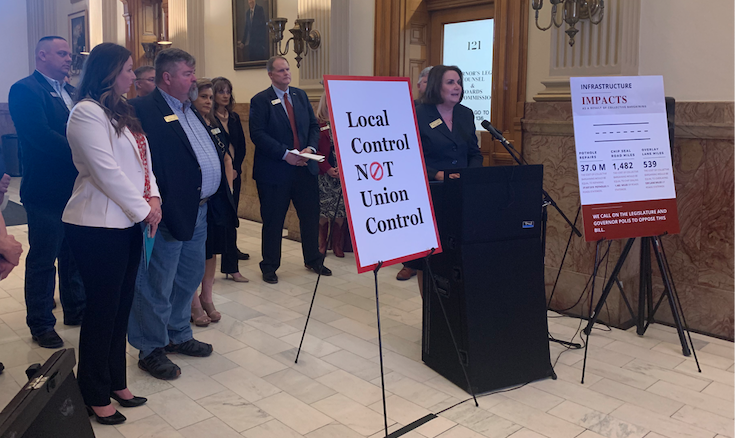County commissioners speak out against collective bargaining bill

A dozen county commissioners – who represent large, urban counties and some of the state’s smallest, rural ones – spoke out Friday against legislation that initially sought to permit a wide swath of government workers to collectively bargain but which has been winnowed down to just counties.
The latest draft of the bill, which is expected to be released on Friday, would require counties to engage in collective bargaining for most county employees.
Colorado Counties, Inc., which represents 62 of the state’s 64 counties, strongly opposes the measure.
The biggest concern raised by counties at Friday’s news conference deals with the bill’s unfunded mandate. Many said they would either have to ask voters for tax increases, cut services or lay off employees in order to cover the costs they argued would arise out of the legislation
Douglas County Commissioner Lora Thomas said her county pegs those costs at $50 million and claimed the proposal would put a barrier between management and employees.
“We enjoy a very collaborative process,” Thomas said of the county government and its employees, maintaining those employees know what works best and adding in unions to the mix would halt those discussions.
Nothing in existing state law bars counties from developing collective bargaining agreements, according to Scott James of Weld County. Four counties do have those agreements.
“But this is a local decision that should be left to local governments,” James said.
Several county commissioners noted they recently restructured pay scales, and that resulted in pay increases for county employees. Eric Stone from Teller County said his county looked at every position and what to pay employees. Commissioners went to employees in every department to explain the raises, he said.
“Those types of relationships would be not be able to continue if collective bargaining is approved,” Stone said.
Should the bill become law, he warned, commissioners will have to decide which of their essential services will have to be cut back or eliminated.
Terry Hofmeister represents one of the state’s smallest counties – Phillips, in northeastern Colorado – and said his county employs just 47 staffers with a $10 million budget.
“We do not have any employees that are dissatisfied,” he said, calling the county a “tight-knit family.”
“We’d like to keep it that way,” Hofmeister said, adding commissioners do not need the state to tell them how to run the county.
Should the proposal pass, they would have to hire a human resources person and attorney to help with negotiations, something they don’t have the money for, and warned it would break his county, Hofmeister said.
Last week, Bent County experienced a devastating wildfire that destroyed two homes, forced the evacuation of the Fort Lyon rehab facility, and scorched eight square miles of grassland. The response required the efforts of much more than just law enforcement and firefighters, Bent County Commissioner Kim McDonough said, noting it also meant pulling in road and bridge personnel, transit, community center employees and the fair board to help fight the blaze.
If something similar were to occur in the future, fewer employees might be available, she said.
“We are a poverty county,” McDonough said, adding Bent is one of the poorest in the state. She warned that collective bargaining would result in cuts on services or personnel.
Fremont County Commissioner Kevin Grantham, a former Senate President, said his county also has restructured its pay scale, and that led to a 10% to 15% pay increases for employees. The bill, he said, would jeopardize county jobs and result in an annual cost of $6 million to $9 million. The county simply cannot take a hatchet to its budget to pay for it, Grantham said.
Grantham also pointed out that collective bargaining is not essential to the delivery of state services by counties, and his county has been doing that for 160 years without collective bargaining.
The state’s largest county, El Paso, would have to come up with $25 million per year to pay for collective bargaining costs, said Commissioner Carrie Geitner. That’s 5.6 million potholes that will go unfilled, 225 miles of road not sealed and 251 sheriff’s deputies they can’t hire, she said.
“This is bad policy at a bad time,” she said.
Geitner was one of several commissioners who complained that the sponsors – House Majority Leader Daneya Esgar of Pueblo and Senate President Steve Fenberg of Boulder – have not worked with the counties on the bill, a criticism that has dogged the legislation since late last year.
One major change from earlier draft versions of the bill is the inclusion of language around strikes and work stoppages, but it doesn’t ban employees from doing that, according to James. The draft bill’s language said an “executive representative” – likely management or a union leader – could not order a strike or work stoppage, but the bill does not prohibit employees from going out on strike, James said.
Nicholas Voutsinos of the American Federation of State, County and Municipal Employees told Colorado Politics Friday that one of the main reasons county employees want a seat at the table is so they can work with management to come up with solutions to staffing shortages.
While he claimed a 2019 Colorado WINS-backed study showed turnover among county workers costs those counties millions of dollars per year, the study didn’t mention county turnover. The was about turnover in state government.
042122 draft of collective bargaining bill

marianne.goodland@coloradopolitics.com













